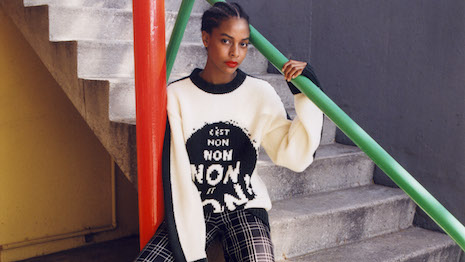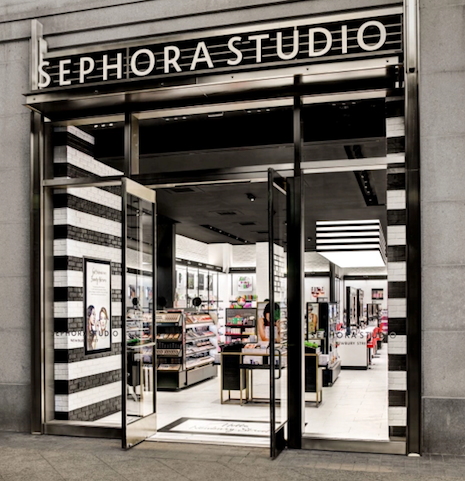 Nordstrom fall 2018 campaign. Image credit: Nordstrom
Nordstrom fall 2018 campaign. Image credit: Nordstrom
To reach the emerging luxury consumers in the millennial and Gen Z age groups, brands need to deliver on individuality and personalization.
A new report from media group Condé Nast finds that the labels and retailers succeeding at driving affinity from these generations offer a brand experience that is unique rather than catering to the masses. Dubbed the “next gen” by Condé Nast, these consumer demographics are set to become a greater part of the luxury business in the coming years as more of Gen Z enters the workforce and millennials enter their peak earning years.
"Despite their spending power, millennials and Gen Z present a challenge for marketers as they value authenticity, transparency and social consciousness and they can spot a fake from a mile away," said Courtney Verdier, vice president of brand strategy at Condé Nast, New York.
"When you widely reflect those values these generations end up being your biggest advocates," she said. "However, if you get them wrong they will ignore you or worst yet, publicly show you the error of your ways.
"These generations grew up in the mobile and social digital ages. Not only do they favor these modes of communication, they have a keen understanding of how they work, which makes them a very powerful asset—or liability—on behalf of your brand. These younger consumers are prime for brand conversations as they accumulate more spending power over time."
Condé Nast’s 2018 Love List Brand Affinity Index, produced in partnership with Goldman Sachs, is based on a survey of almost 1,500 women ages 13 to 34 as well as 1,200 of the media company’s It Girls.
Next gen
The index found that It Girls, those who engage with at least one Condé Nast brand and who are considered trendsetters, use a balance of in-store and online shopping. They tend to favor ecommerce for convenience, while also turning to physical stores for experiences.
Among all millennials and Gen Zers, Amazon was mentioned the most by respondents when they were asked what applications they use now that they did not use much mere months ago. Snapchat and Instagram were also frequently mentioned as having gained usage.
While Victoria’s Secret was named the respondents’ number one favorite brand, Sephora followed in second place. The beauty retailer came out on top in its category.
Sephora delivers the personalization that these consumers crave, whether enabling virtual try-ons via smart mirrors and smartphone screens or customizing a shopper’s browsing experience.
 Sephora Studio store. Image credit: Sephora
The in-store environment is also aimed at providing a hands-on experience, allowing consumers to interact with products through guided workshops and in-store technology.
Along with consumers’ high affinity for Sephora, respondents said they are using the retailer’s app more now than they were in the recent past.
Nordstrom also scored at the top of its category, coming in first among luxury retailers.
Similarly to Sephora, Nordstrom has a focus on delivering both personalization and omnichannel retail. A recent study also found that affluent consumers deem the department store chain the most emotionally intelligent (see story).
"Sephora and Nordstorm's popularity with these generations is really tied to their understanding of consumer behavior, and how that differs by generation," Ms. Verdier said. "Sephora really pushes a great in-store experience without sacrificing their ecommerce platform, which is also very user-friendly. Sephora is also putting on an event called Sephoria centered around the idea of beauty education and tutorials—another way to satisfy consumer demand for interactive beauty experiences.
"Nordstrom continues to expand their in-store and online presence with a variety of brands and experiences that cater to their customer's every need," she said. "They are not afraid to carry brands by social media influencers or experiment with lines from young entrepreneurs because they understand younger generations like to support those types of endeavors.
"Additionally, both of these companies have very flexible return policies and outstanding customer service leading consumers to feel empowered within the purchase cycle. Unlike other retailers, these companies don't make customers feel like they are the mercy of their purchases but rather want them to feel that they are in control of their purchase even if they are dissatisfied with it. There is always a path to resolution with these retailers."
In handbags, affordable luxury brands Michael Kors, Kate Spade and Coach came out on top, while Gucci led the luxury brands, followed by Louis Vuitton. The top fragrance brands for this consumer sect are Chanel and Marc Jacobs.
Sephora Studio store. Image credit: Sephora
The in-store environment is also aimed at providing a hands-on experience, allowing consumers to interact with products through guided workshops and in-store technology.
Along with consumers’ high affinity for Sephora, respondents said they are using the retailer’s app more now than they were in the recent past.
Nordstrom also scored at the top of its category, coming in first among luxury retailers.
Similarly to Sephora, Nordstrom has a focus on delivering both personalization and omnichannel retail. A recent study also found that affluent consumers deem the department store chain the most emotionally intelligent (see story).
"Sephora and Nordstorm's popularity with these generations is really tied to their understanding of consumer behavior, and how that differs by generation," Ms. Verdier said. "Sephora really pushes a great in-store experience without sacrificing their ecommerce platform, which is also very user-friendly. Sephora is also putting on an event called Sephoria centered around the idea of beauty education and tutorials—another way to satisfy consumer demand for interactive beauty experiences.
"Nordstrom continues to expand their in-store and online presence with a variety of brands and experiences that cater to their customer's every need," she said. "They are not afraid to carry brands by social media influencers or experiment with lines from young entrepreneurs because they understand younger generations like to support those types of endeavors.
"Additionally, both of these companies have very flexible return policies and outstanding customer service leading consumers to feel empowered within the purchase cycle. Unlike other retailers, these companies don't make customers feel like they are the mercy of their purchases but rather want them to feel that they are in control of their purchase even if they are dissatisfied with it. There is always a path to resolution with these retailers."
In handbags, affordable luxury brands Michael Kors, Kate Spade and Coach came out on top, while Gucci led the luxury brands, followed by Louis Vuitton. The top fragrance brands for this consumer sect are Chanel and Marc Jacobs.
 Michael Kors is popular among next gen consumers. Image credit: Michael Kors
The study also looked at the brands gaining traction with millennials and Gen Z consumers, asking the participants which labels they are buying more of or hearing about more today than last year.
Among emerging brands, Fenty Beauty was mentioned by the most respondents, while Glossier came in second.
Meanwhile, established brands including Anastasia Beverly Hills, Sephora and Gucci are on next gen consumers’ radars more these days.
Emerging market
Despite being digitally driven, Generation Z consumers value bricks-and-mortar shopping and tactile retail experiences.
A new report from Criteo finds that while three-quarters of this up-and-coming consumer group prefer to shop online, 80 percent enjoy visiting physical stores when possible and 65 percent want to touch items before buying. Rather than eschewing traditional retail entirely for ecommerce, Gen Z is instead seeking bricks-and-mortar stores that incorporate technology and seamless omnichannel shopping (see story).
Millennials’ spending habits continue to perplex retailers and manufacturers as the group ages, with recent findings showing that 51 percent would forgo healthcare in favor of luxury goods.
Many industries have been impacted by the constant evolving interests of millennials, with the diamond industry one of the most impacted. A survey from The Pearl Source shows that while diamonds are still the most popular, about 46 percent of millennials would rather buy alternative jewels, as the generation is also spending money they do not have (see story).
"These consumers are a marketer's dream generation," Ms. Verdier said.
"They are not necessarily taking a linear path to their lives meaning they don't always make decisions based on long-term planning," she said. "For example, younger consumers may not strive towards home ownership but rather value the experience of living in different locations even if that means they rent for the rest of their lives.
"Essentially, these younger consumers are willing to sacrifice tomorrow's plans for today's experiences, so if a luxury brand can show them that experience is worth having, they will find a way to obtain it even if it means having to figure something else out in the future."
Michael Kors is popular among next gen consumers. Image credit: Michael Kors
The study also looked at the brands gaining traction with millennials and Gen Z consumers, asking the participants which labels they are buying more of or hearing about more today than last year.
Among emerging brands, Fenty Beauty was mentioned by the most respondents, while Glossier came in second.
Meanwhile, established brands including Anastasia Beverly Hills, Sephora and Gucci are on next gen consumers’ radars more these days.
Emerging market
Despite being digitally driven, Generation Z consumers value bricks-and-mortar shopping and tactile retail experiences.
A new report from Criteo finds that while three-quarters of this up-and-coming consumer group prefer to shop online, 80 percent enjoy visiting physical stores when possible and 65 percent want to touch items before buying. Rather than eschewing traditional retail entirely for ecommerce, Gen Z is instead seeking bricks-and-mortar stores that incorporate technology and seamless omnichannel shopping (see story).
Millennials’ spending habits continue to perplex retailers and manufacturers as the group ages, with recent findings showing that 51 percent would forgo healthcare in favor of luxury goods.
Many industries have been impacted by the constant evolving interests of millennials, with the diamond industry one of the most impacted. A survey from The Pearl Source shows that while diamonds are still the most popular, about 46 percent of millennials would rather buy alternative jewels, as the generation is also spending money they do not have (see story).
"These consumers are a marketer's dream generation," Ms. Verdier said.
"They are not necessarily taking a linear path to their lives meaning they don't always make decisions based on long-term planning," she said. "For example, younger consumers may not strive towards home ownership but rather value the experience of living in different locations even if that means they rent for the rest of their lives.
"Essentially, these younger consumers are willing to sacrifice tomorrow's plans for today's experiences, so if a luxury brand can show them that experience is worth having, they will find a way to obtain it even if it means having to figure something else out in the future."
